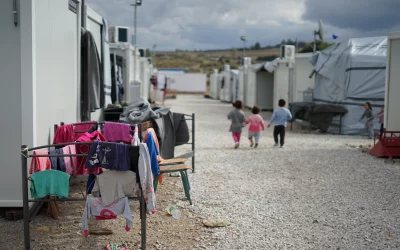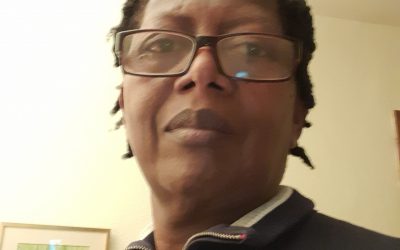When you experience predominantly negative or even a lack of representation, it can result in a loss of identity. Black History Month (BHM) works to reaffirm the identity of Black people, past and present, by acknowledging and celebrating their contribution to the UK.
What can you do when your ancestors were fundamental in building Britain and an integral part of its history, but their role has been whitewashed – ignored or distorted? The answer lies in the annual UK Black History Month (BHM), a celebration of Black people’s rich and diverse past and present achievements and contributions to British society. Taking its lead from its counterpart in the USA, the UK BHM takes place every October.
This year, BHM 2023 celebrates the exceptional achievements of Black women under the banner of #SalutingOurSisters and #WEMATTER. Many delighted in the high-profile roles undertaken by Black women in the coronation of King Charles, with women such as Valerie Ann Amos, a Guyanese-British politician and diplomat, Floella Benjamin, a Trinidadian-British politician and businesswoman, and Rev. Rose Hudson-Wilkin, a Jamaican-British Anglican prelate, who serves as Suffragan Bishop of Dover in the Diocese of Canterbury.
However, Black female heroes and role models go back throughout history to ancient times. One of many notable women being Mary Seacole, a migrant from Jamaica. Despite being a nurse and much needed during the Crimean War, she was rejected by the British War Office because of the colour of her skin. However, ignoring this rejection she went at her own expense to bravely care for British soldiers at the battlefront. Moving to current times, young readers are enjoying the many books written by Malorie Blackman OBE, the first Black writer to hold the position of Children’s Laureate from 2013 to 2015. As a child, Malorie loved reading, but none of the books featured Black characters, so she set out to write books to include Black characters so that Black readers could identify with them. Through her writing, she aims to change people’s views and cultivate an understanding of different ethnicities and diverse cultures, rather than relying on stereotypical views. Likewise, we know that music transcends all cultures, and the musical skills of Joan Armatrading certainly transcends a diverse audience. A migrant from the West Indies who settled in Birmingham, she began writing songs at 14, and by the 1970s, she was the first Black-British singer-songwriter to enjoy success in the USA.
These women act as role models for today’s generation of Black women. Whether famous or a woman who lives an ordinary life, Black female role models of all backgrounds and professions are crucial when it comes to inspiring young Black women. Such role models show girls what they can achieve despite discrimination based on gender and/or race. In 2023, BHM #salutingoursisters celebrations will showcase Black female role models who have made remarkable contributions to literature, music, fashion, sport, business, politics, academia, social and health care. However, as already mentioned, while these high-profile Black women should be celebrated, support is still needed for the ordinary Black women who face discrimination across all aspects of their lives. Significantly, a report issued in 2023 highlighted that maternal mortality for Black women is almost four times higher than for White women. Similarly, in a 2022 report by Fawcett Society, a gender equality organisation and race equality think tank, the “Runnymede Trust” stated that 75% of women of colour experience racism at work. Research such as this clarifies why Black women need to be seen and heard, and that awareness, education and change are needed to address these imbalances.
BHM contributes to influence and effect these changes. Looking at its history, the grassroots of BHM in the UK is traceable back to the 1970s, a period of significant social and political change and a surge in racism. However, it was in 1987 that the first official BHM UK celebration took place, initiated by Ghanaian-born Akyaaba Addai-Sebo. He believed that all young people, particularly young Black boys and girls, would “gain self-pride if their living environments buzzed with positive vibes, instructions and images about themselves and their origins”. For many Black children, a predominantly white-based society was diluting their culture, history, and identity. And so, with the support of the Greater London Council and the Inner London Education Authority, the inaugural celebration of the contributions of Africans and people of African descent to world civilisation past and present was held. And while Addai-Sebo has stepped back from leading BHM, almost 40 years on the celebrations continue throughout the month of October with various events and activities from lectures, exhibitions, concerts, film screenings, and much more. Underlying all the festivities is a strong focus on education – educating people on the history of Black individuals and communities, sharing a greater understanding of Black history and culture and, crucially, challenging and addressing issues related to racism and inequality.
Despite its combined role of celebration and education, BHM has been criticised by both Black and White communities. With arguments ranging from “Why a Black History Month and not a White History Month” to it simply being an exercise in tokenism for just one month a year instead of being an integral part of British society and, importantly, the British educational curriculum. Sadly, until there is a balance in identity policies in the UK and when the identities and roles of Black people (and other minorities) are recognised and acknowledged at the same level as “the average white man”, events such as Black History Month, are essential to raise the profile of the invisible. Until change is affected, we need BHM to continues its role to recognise contributions from Black communities, promote inclusion and equity, inspire younger Black people facing racial discrimination, and to challenge stereotypes to break down misconceptions. To say nothing of its role in facilitating cultural exchange through music, art, poetry, and food festivals.
The truth is that Black History and Black representation is essential not just in October but for every month of the year and across all communities in the UK.
For further information and reading on Black History Month, go to the links in this article and these other sites.
Black History Month Organisation
BBC- What is Black History Month, and why does it matter?
The Guardian- Articles related to Black History Month
BBC – The black British history you may not know about
To read more about the lives and impacts of migrants on UK society, go to TogetherintheUK.
To purchase a copy of Hear Our Stories, an anthology of migrant writings compiled by TogetherintheUK, go to Support Us.
Photo by guilherme-stecanella







